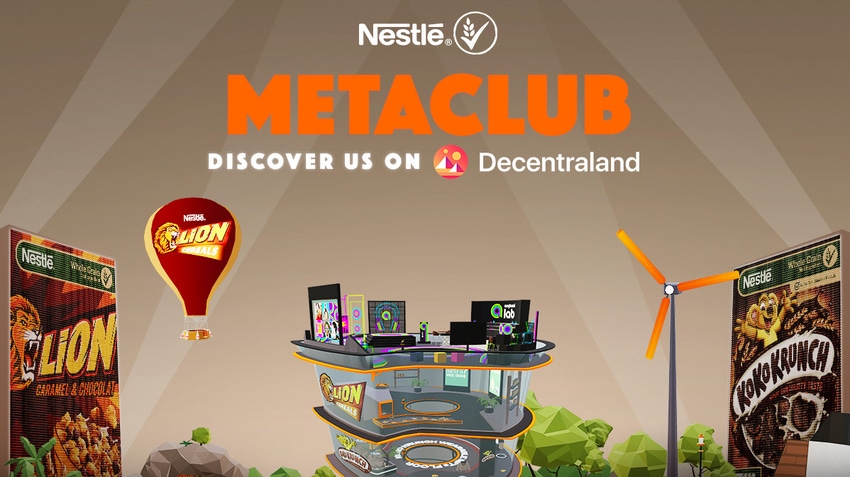Nestlé is promising to take you ‘beyond the cereal bowl’ with a splurge of loosely defined metaverse, web3 and sustainability marketing concepts.
April 18, 2023

Nestlé is promising to take you ‘beyond the cereal bowl’ with a splurge of loosely defined metaverse, web3 and sustainability marketing concepts.
We’re told The Nestlé Cereals Metaclub – brought to you by Cereal Partners Worldwide, the firm behind Cheerios – contains 10 virtual attractions hosted on metaverse platform Decentraland, and will include online challenges and NFTs ‘with real life rewards.’
It’s being launched in partnership with the ecological charity the Rainforest Alliance and Anghami, a music streaming service founded in Lebanon. The former has helped build Rainforest Corner which is supposed to raise awareness of sustainability issues and encourage donations, while the latter is bringing with it a digital lounge with curated playlists (presumably made up of songs about eating cereal) and a free subscription.
There will also be a Nestlé Cocoa Plan Zone which purports to spotlight how the firm responsibly sources cocoa, and the tantalising prospect of a ‘virtual breakfast cereal factory’ based on Nestlé’s Karacabey Factory in Turkiye, which again is supposed to somehow show off how renewable energy is efficiently used.
“Living up to our purpose to “Make Breakfast Better”, we are excited to be the first Breakfast Cereal Business to enter the metaverse and aim to create immersive and rewarding experiences for our consumers to enjoy and connect with our brands while raising awareness with our dedicated sustainability attractions,” said Nehmatallah Younes, Business Executive Office, Cereal Partners Worldwide, Middle East & North Africa.
Bahaa Boulmona, Brand Manager, Cereal Partners Worldwide, Middle East & North Africa added: “Our Nestlé Cereals Metaclub offers a unique channel to engage and connect with younger audiences, educate them on the topics of sustainability, while taking them through an omnichannel brand experience.”
There’s a lot of marketing guff to unpack in those quotes – and while it’s easy to snipe at nascent metaverse explorations, there’s something in this one that says so much about the confusion as opposed to the actual point of the metaverse, and of corporate marketing in general.
While leading metaverse users through an ‘omnichannel brand experience’ may appeal to Cereal Partners Worldwide marketing department, it’s not clear what is in it for anyone else. This venture appears to essentially be an explorable virtual advert, which somehow seems all the more ridiculous in the service of flogging sugary breakfast cereal.
The crowbarring in of sustainability themes and the grasping for ethereal technology buzzwords is something we see a lot of in corporate messaging. While it’s always good to know firms are doing more to not damage the earth as they go about their business, it’s fair to note that telegraphing these endeavours also provides many firms with a rich vein of self-promotional materials – and don’t they know it.
Leaving that aside, launches like this leave you wondering if is this what the metaverse is going to look like. Is this what it’s for? That’s not an unfair question considering it remains fairly undefined, aside from a VR gaming context (which existed before firms starting going on about the metaverse at every opportunity), what the metaverse actually is, other than ‘revolutionary’, ‘immersive’ or some other such handwaving description.
That it provides another avenue for digital marketers to pour cash into is not so surprising, but the very idea of people voluntarily wandering around inside an ad – sorry ‘omnichannel brand experience��’ – is a little hard to get your head around.
Perhaps there is an analogy to the early days of the internet, when big brands like McDonald’s would throw up a clunky web page of some sort with a rudimentary game on it, because it seemed like the thing to do. But users were primarily snapping up dial up internet connections and big beige desktops to explore the new frontiers of email, instant messaging, file sharing, message boards, and other furtive interests we’ll decline from elaborating upon.
It feels like big corporate marketing money is leading the charge this time round and, while there are novelties like ‘virtual concerts’ out there, we are basically still waiting for convincing reasons the world is going to want to strap on VR headsets and jump in en masse. Until that happens, unusual corporate pushes like this one, with vague nods to NFTs and that sort of thing thrown in for good measure, could be increasingly representative of what is on offer.
Get the latest news straight to your inbox. Register for the Telecoms.com newsletter here.
About the Author(s)
You May Also Like








.png?width=300&auto=webp&quality=80&disable=upscale)


_1.jpg?width=300&auto=webp&quality=80&disable=upscale)


.png?width=800&auto=webp&quality=80&disable=upscale)